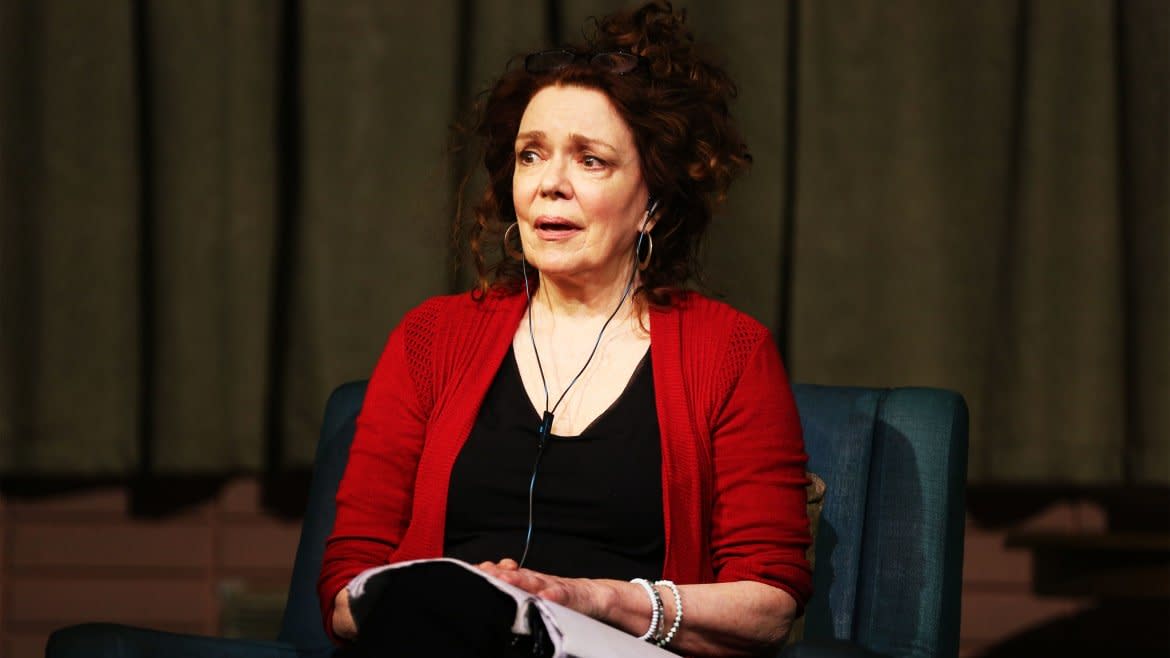Lucas Hnath Turns His Mother’s Brutal Kidnapping Into the Stunning Play ‘Dana H.’

In 1997, Dana Higginbotham, mother of playwright Lucas Hnath, was kidnapped and held hostage for five months, her captor moving her from motel to motel in a horrific, nightmarish American road trip.
In response, Hnath—multi-award-winning playwright of productions including A Doll’s House, Part 2—has written the stunning play Dana H. (Vineyard Theatre, to March 29).
Seventy-five minutes long, and directed by Les Waters, it stars a transfixingly good Deirdre O’Connell as his mother, Dana Higginbotham. O’Connell, who has performed the play in L.A. and Chicago before this New York run, first takes her seat on Andrew Boyce’s set, which evokes a nondescript motel room, the walls the color of Pepto-Bismol. She is wired up to a microphone and earbuds. We learn via surtitles that she will lip-sync Higginbotham’s words, as recorded in an edited interview conducted by a theatrical colleague of Hnath’s, Steve Cosson.
Laurie Metcalf Leads a Masterful Broadway Sequel in ‘A Doll’s House, Part 2’
And so this astonishing exercise begins. It is not lip-syncing, because that implies a very basic act of impersonation or mimicry. For one, O’Connell masters every rustle, movement of the body, caught breath, laugh, rise of emotion. Every sound that is on tape, every pause, everything, is replicated by her.
But she also inhabits the character of Higginbotham sweepingly too, just sitting there, facing us. The play begins and ends with a meditation on death. Higginbotham, in her regular life, is a hospital chaplain who helps people and their loved ones prepare for death, this after her own life was taken away from her by her assailant and abuser. The threat of death, and extreme violence, is what he uses to prevent her from escaping.
She is in situations—in cafes, and public places—where she wants to make a break for it, or try to tell someone what is happening. But she cannot. He is also a member of the Aryan Brotherhood and a criminal, and Higginbotham finds herself drawn deeper into his web of madness, with receding opportunities of escape. O’Connell’s gallery of facial expressions and gestures convey confusion, fear, and brutalization—and occasionally, amazingly, humor.
We feel increasing, wrenching desperation watching this story of coercive confinement, although more and more frustrated with Cosson as an interviewer. He asks questions, but they are of the extremely basic kind. Perhaps he was being understandably gentle with his friend’s mom, but interviews are interviews, and a play is a play—and too much in Dana H. is simply left unasked and unanswered, such as where was Hnath in all this?
He was a New York University student at the time, and the play does not make clear if he knew about his mother’s kidnapping. Indeed, it doesn’t make clear if law enforcement knew and was trying to find her. It seems odd that Higginbotham was kidnapped and essentially left her life for five months, and no family or authorities attempted anything to return her to safety. (The Daily Beast sent a list of questions to the play’s spokesperson for Hnath and received no response.)
Beyond such puzzles and gaps, Dana H. is excellent, particularly when Waters, lighting designer Paul Toben, and sound designer Mikhail Fiksel bring the motel room to loud, insane life to convey the disorientation and terror—and geographical dislocation—that Higginbotham endured.
An uncredited actor playing a maid tidies the room (that is really, many rooms) in this interlude before O’Connell returns to the stage to complete her act of theatrical virtuosity—and nothing that is missing from Higginbotham’s account diminishes that virtuosity. Go see Dana H. for O’Connell’s singular, truly mesmerizing performance.
At Second Stage, Young Jean Lee’s We’re Gonna Die (Second Stage, through March 22) is an insubstantial, 65-minute meditation on mortality with some well-played and -voiced songs. That banner headline whizzes past in neon as a welcome to the theater. The excellent singer Janelle McDermoth leads the show, with musicians stationed around the stage, which is designed by David Zinn to look like a kind of celestial purgatory-meets-bus station, with black and white balloons falling silently down into one corner of the stage.
There are stories of illness and tragedy related to us and personal confessions, but there is also a lot of not very deep thinking about coming to terms with death.
At the end, the entire company tries (and at the performance I attended, not that successfully) to lead a theater singalong to the show’s title song, and the stage erupts into a kind of tedious chaos of dancing, mess-creation, and flying balloons. The show is extremely lucky to have McDermoth’s singing.
Get our top stories in your inbox every day. Sign up now!
Daily Beast Membership: Beast Inside goes deeper on the stories that matter to you. Learn more.


